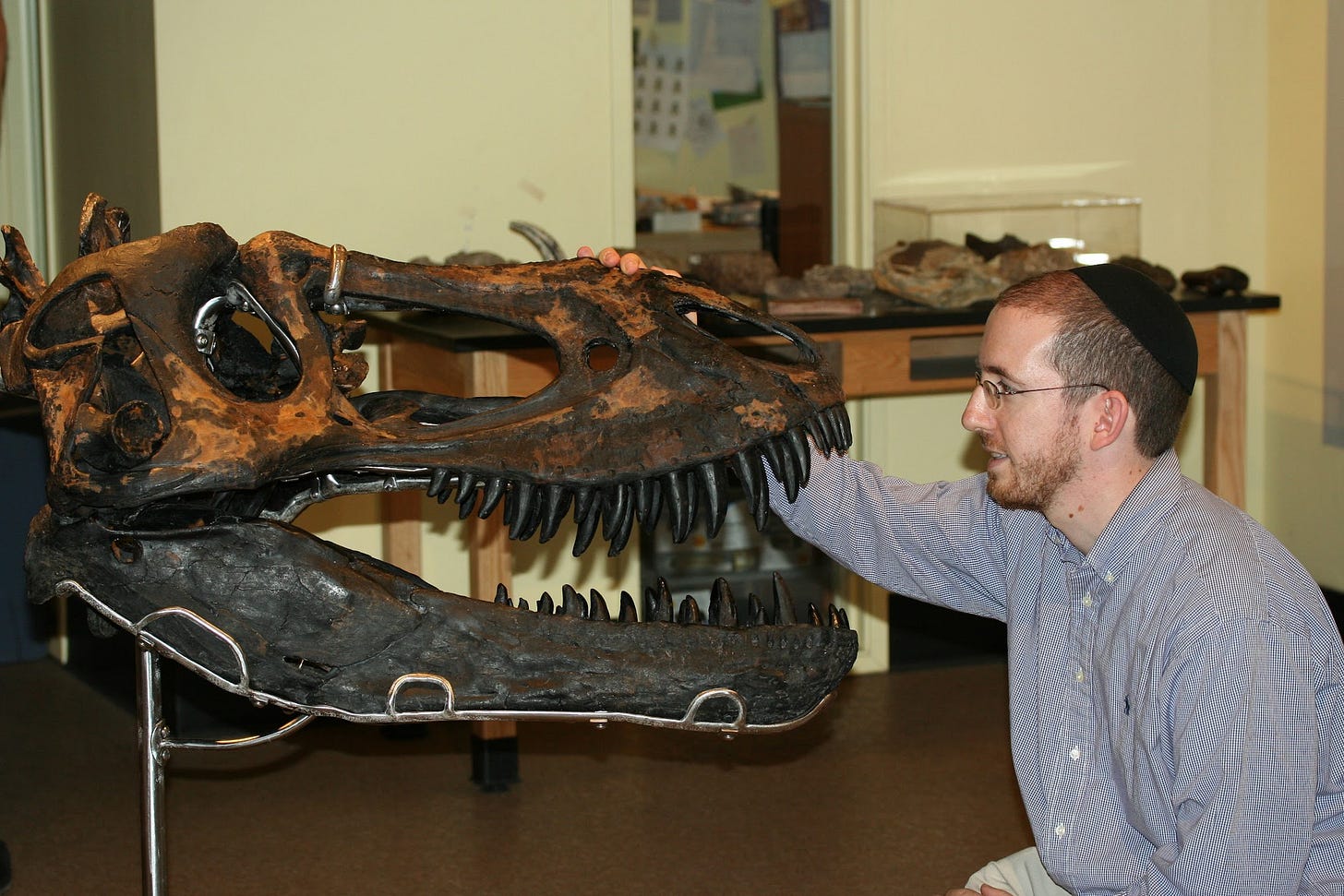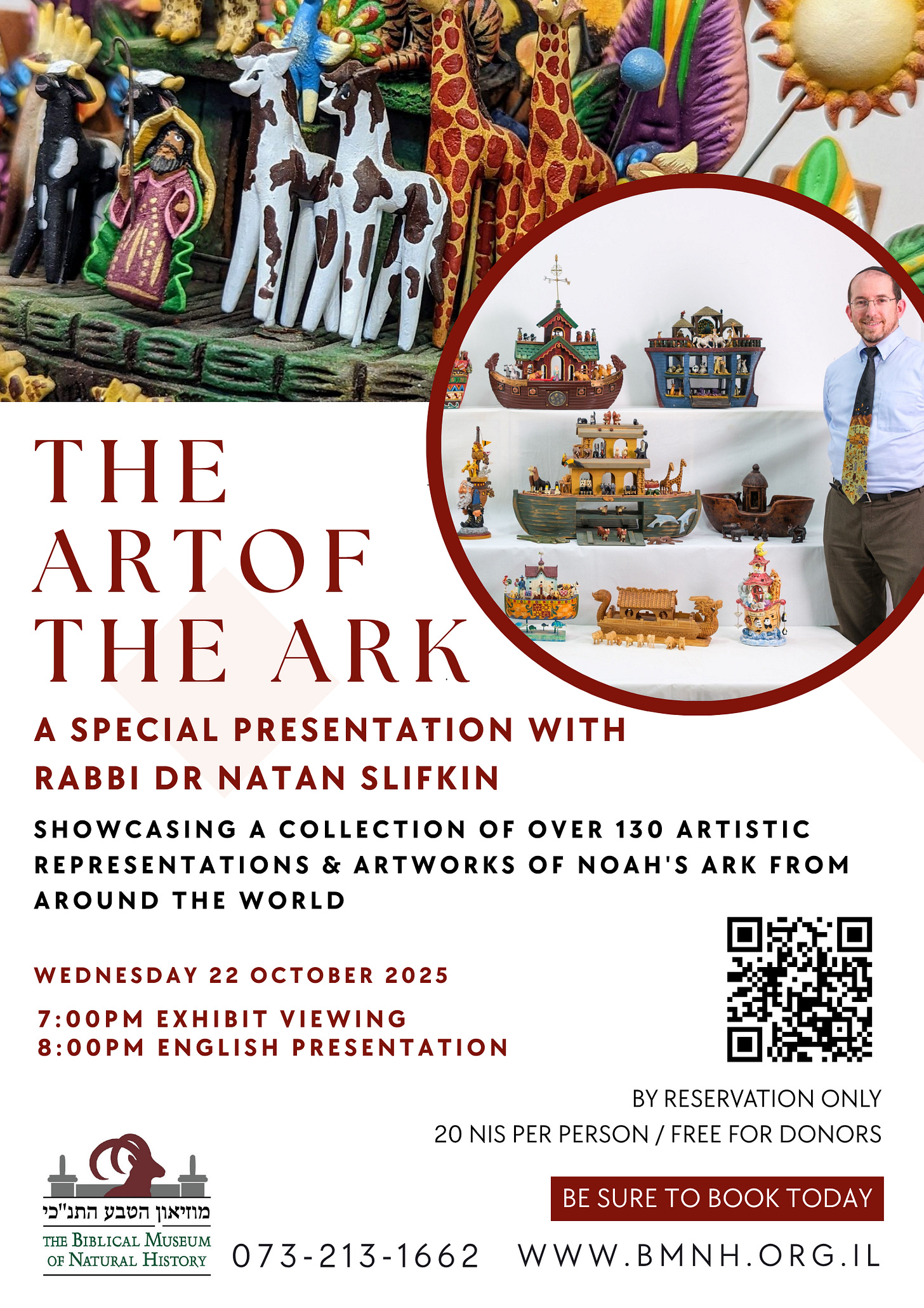When Dinosaurs Become Dinosaurs
Scary primitive creatures get superseded
The other day I saw someone observe that if a polar bear spent time at both the North and South Poles, and had a psychological condition that caused it to experience extreme mood swings, and was attracted to both males and females of its species, then it would be a bi-polar bipolar bi polar bear. I love this sort of wordplay, but my best attempt to match it is to write a post about how dinosaurs (as in the extinct creatures that we love) have become dinosaurs (as in something obsolete) - at least, for me.
For many years I was not only fascinated by dinosaurs as extraordinary creatures, but also by the challenge that they raised for our understanding of this week’s parasha, Bereishis. As is well known, I ended up writing a book on it which, along with two of my other books, were spectacularly banned. Here’s a video of the late Rav Aharon Shechter of Yeshivas Chaim Berlin denouncing me for even discussing the topic, which he insists we must not think about:
Little did he know that avreichim in his kollel had been asking me for years to explain this topic to them since they didn’t want to ask him. The ban on my books resulted in a huge backlash against the 36 charedi “Gedolim” who banned them. And the dynamics of the controversy over this topic became as interesting as the topic itself. I ended up figuring out that it largely boiled down to the conflict between rationalism and mysticism. This became the subject of a book on that topic, along with generating this blog, the very first post of which, sixteen years ago, was about how people realized that there were prehistoric eras.
Yet now, I have so little interest in either the ban or in dinosaurs. Ever since October 7th, it all seems so trivial. The hugely important issues with the charedi world refusing to help with the war and draining the economy make dinosaurs seem so insignificant by comparison. The only primitive creatures rampaging around that concern me now are charedim throwing rocks and firebombs at my daughter’s army base and blocking streets to protest the imposition of basic civic values.
Still, the two are, to some degree, related. The charedi refusal to accept the existence of the dinosaur eras or even address the challenge that dinosaurs raise is all part of their approach of intense isolation. And this is also why they refuse to share in the responsibilities of living in a country or even address the question of how Israel will survive if a third of the population refuses to serve or contribute its share to the professional workforce and the economy.
But this bigger problem is only going to be solved by cutting off the money, not by explaining why modern science should be accepted. Still, if you’re interested in learning more about different aspects of dinosaurs and Judaism, here’s a list of my posts on the topic:
From Zoologist to Rationalist - in which I explain the role that dinosaurs played in my own evolution;
Strengthening Emunah: Via Denying Dinosaur Eras, or Sentient Pigs? - in which I explore different charedi approaches to emunah;
The Great Dinosaur Mistake - in which I explain that it is an error to believe that people who believe in dinosaurs are necessarily rationalists;
Confronting Dinosaurs - in which I note how some people who present themselves as experts on Torah and science, such as Rabbi Moshe Meiselman, are fascinatingly reluctant to discuss whether and when dinosaurs existed;
Denying the Dinosaur Eras - in which I explore further problems with Rabbi Meiselman’s view regarding prehistory;
Art by God - in which I discuss the question of who made fossils and cave art;
Adam and the Dinosaurs - in which I discuss the difference between Christian and Charedi approaches to dinosaurs;
The Skeleton in My Closet - in which I explain why I keep a dinosaur fossil in my closet and not on exhibit at the Biblical Museum of Natural History;
Were there Dinosaurs on the Ark? - the topic of which is obvious;
Dinos and Rhinos - which isn’t really about dinosaurs other than having a funny story about Jews and dinosaurs;
Ten Questions on Evolution and Judaism - which is self-explanatory.
And of course my own approach to the topic of dinosaurs, the development of the universe and the evolution of life is discussed in detail in my book The Challenge of Creation (available on the museum website, but please note that we are currently changing warehouses and there will be a delay in shipping.)
Happy reading! Meanwhile, for those in Israel, this coming Wednesday I’m giving a presentation at the Biblical Museum of Natural History on the Art Of The Ark. Reservations are required - you can book for the English presentation at this link.





Oh, I forgot to add: What do you call a dinosaur that believes in its own existence? An Apikorusaurus.
Off topic of this Dinosaur piece, I just received my Lions of Zion book in the post. It’s such a wonderful book that everyone should have in their library! I managed to read 119 pages over the Chag. I have all your books and this one doesn’t disappoint! Though as a vegetarian, I’ll never eat Locusts, even if they are Kosher and killed humanely.😽